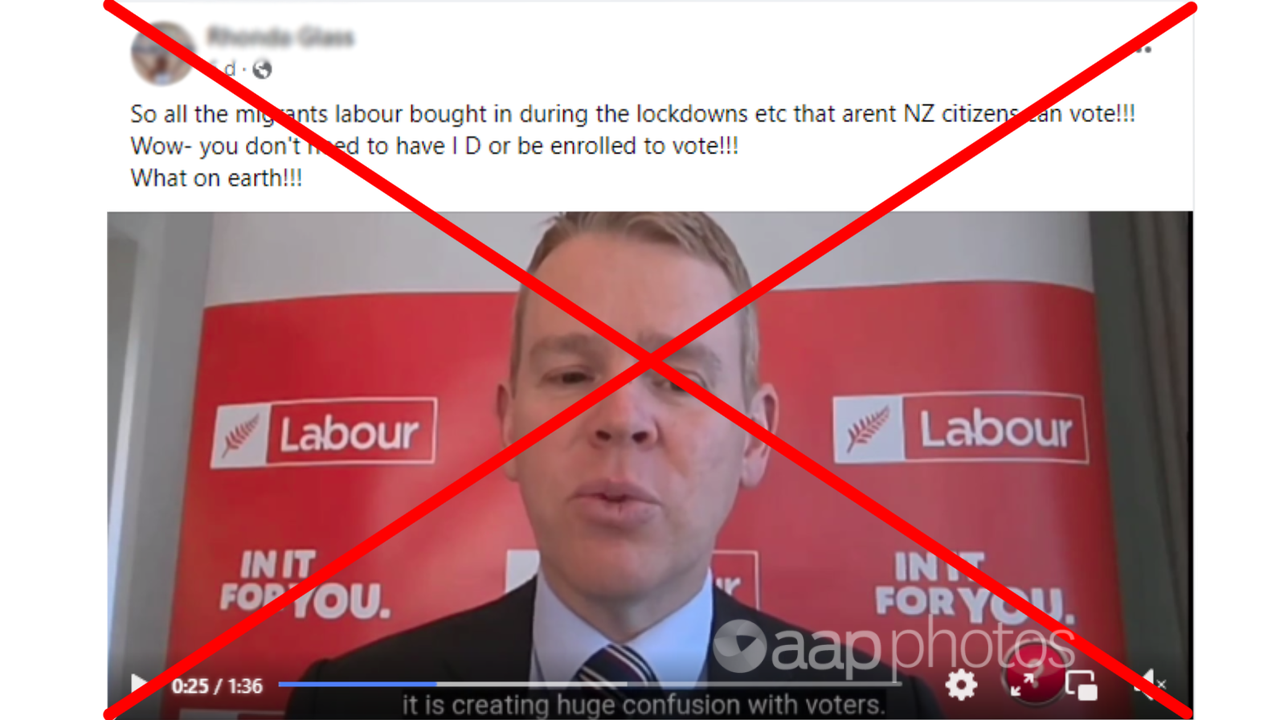A raft of social media posts have responded to comments by New Zealand Prime Minister Chris Hipkins on the ease of voting, claiming anyone who looks over 18 and is currently in the country can vote in the upcoming election.
This is misleading. While it is possible to vote in NZ without identification, the Electoral Commission (EC) has a system of scrutinising and rejecting fraudulent or invalid votes.
The claims follow comments by Mr Hipkins in a Newshub interview shown in this Facebook post. The prime minister was responding to concerns that 10 days out from the election, one million voters still had not received their EasyVote card.
The EasyVote pack, which speeds up the voting process, is sent to NZ voters who were enrolled at their current address by September 10, for the October 14 general election.
“You do not need an EasyVote card to vote,” the prime minister says in the interview.
“In fact, you don’t need to be enrolled and you do not need to take identification with you when you go to vote.
“If you are a New Zealander over the age of 18, you need to show up to a polling booth and the staff will arrange for you to be able to vote.”

In response to the video, the post says: “Does this sound like an election that is safe from fraud?”
Other posts are more direct. This post states: “The government setting up NZ elections so anyone can vote!!! The words from our ‘Esteemed’ Prime Minister ‘You don’t need ID to vote!!!’ So anyone in this country who looks to be 18 or any adult can vote!! You don’t need to be on the electoral roll!!”
In a separate post, the same Facebook user says: “So all the migrants labour bought in during the lockdowns etc that arent (sic) NZ citizens can vote!!!”
It’s true that voters don’t need ID and don’t need to be on the electoral roll when they arrive at a polling booth to vote.
The EC is clear about the process on its website.
“You don’t need to take your driver licence, your passport, or anything else with you to a voting place. No ID is required,” it states.
“Your EasyVote card, if you have one, will make voting faster — but you can vote without it.
“When you go to vote, you’re either marked off the printed roll at the voting place, or your details are recorded. During the official count, we compare all the rolls from all the voting places in each electorate to make sure everyone has only voted once.”
If a person’s name is not on the printed roll at the voting place they can cast what is called a special vote.
They may not be on the roll for various reasons, including that they’re voting outside your electorate. The only difference in registering a special vote is that the individual is required to fill in an additional form.
“We check every special vote to make sure each person is enrolled and eligible to vote,” the EC says.

“If a special voter’s name isn’t on the electoral roll, the registrar of electors carries out more extensive checks. The registrar then says whether the voter is enrolled.”
Professor Andrew Geddis, an expert in election law at Otago University, explained the “extensive checks” that prevent situations like those suggested in the Facebook posts.
He said that a special vote requires a declaration to be filled in giving the voter’s name, address and confirming their eligibility to cast a vote. This will include that they have at some point lived in NZ for 12 months continuously and that they are an NZ citizen or resident permitted to remain here permanently.
The individual will also need to specify the reason they’re casting a special vote.
“If the voter is not yet enrolled, that declaration serves to enrol the voter to vote (and so allows them to do so),” Prof Geddis told AAP FactCheck by email.
“However, these special votes are not included in the election night count. Rather, the special vote declarations are checked by electoral officials to make sure they are accurate (that the person is entitled to enrol and vote).
“As a part of this, the electoral officials get information from Immigration NZ under the Electoral Act 1993, s 263A, to ensure that someone on a resident visa does have the right to remain permanently. If someone was here as a tourist or similar, this would be flagged at that stage.
“If the electoral officials determine that the special vote declaration is false in some respect, then the special vote is discounted — it never appears in the voting tally at any point.”
The EC confirmed the process of scrutinising special votes described above in an email to AAP FactCheck.
The Verdict
The claim that anyone who looks over 18 and is currently in New Zealand can vote in the election is misleading.
It is true that people don’t need to be on the electoral roll or have ID to cast a vote on October 14.
However, an expert and the Electoral Commission told AAP FactCheck there are extensive checks to prevent illegal and invalid votes from being counted towards the final result.
Misleading — The claim is accurate in parts but information has also been presented incorrectly, out of context or omitted.
AAP FactCheck is an accredited member of the International Fact-Checking Network. To keep up with our latest fact checks, follow us on Facebook, Twitter and Instagram.
All information, text and images included on the AAP Websites is for personal use only and may not be re-written, copied, re-sold or re-distributed, framed, linked, shared onto social media or otherwise used whether for compensation of any kind or not, unless you have the prior written permission of AAP. For more information, please refer to our standard terms and conditions.


















